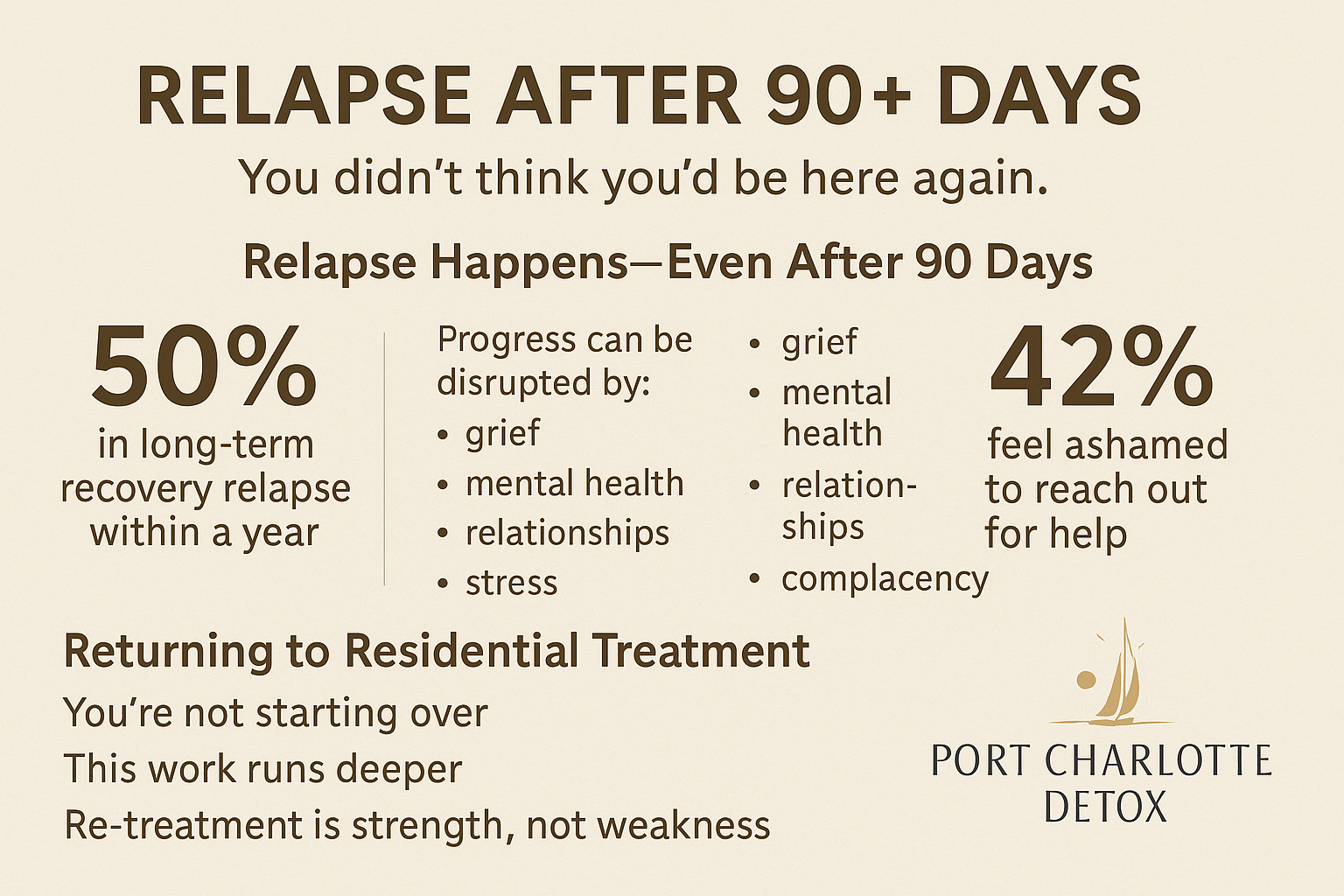You didn’t think you’d be here again.
And if we’re honest? You didn’t want to be.
Because relapse after 90 days feels like a gut punch. The progress, the milestones, the belief—it all feels like it got erased in a single moment. But relapse doesn’t mean the story ends. It just means it needs a new chapter. And for many alumni, a residential treatment program in Port Charlotte becomes the stage where that comeback begins.
You’re not broken. You’re not starting over. You’re just not finished yet.
A Hard Truth: Relapse Happens—Even After 90 Days
There’s a silence that follows relapse in long-term recovery. Not the loud, dramatic kind. The quiet kind. The kind that says: “I should’ve known better. I should be past this.”
You’re not alone in that silence.
Relapse after 90 days is more common than most people talk about. You stop counting days. Life starts happening again. Maybe you get comfortable, or maybe something shakes your foundation—grief, a breakup, a shift in your mental health—and suddenly the coping you’ve leaned on for years pulls you back in.
That doesn’t make you weak. It makes you human.
What matters isn’t whether you stumbled. It’s what you do next.
You’re Not a Newcomer Anymore—This Work Runs Deeper
First-time treatment is about survival. Second-time treatment is about ownership.
You’ve already walked the early path. You’ve detoxed, you’ve group-therapied, you’ve sat in those metal chairs and shared your first shaky truths. But this time, it’s different. You know where the resistance lives. You know where the surface ends.
And now, you’re ready to go deeper.
Returning to a residential program doesn’t mean redoing the same steps. It means doing new work with a more seasoned version of you. The one who’s seen what recovery can give—and what happens when it quietly slips.
The “Comeback Stage” Isn’t About Applause—It’s About Honesty
No one comes back to treatment because things feel great. But they do come back to reclaim something: their voice, their clarity, their peace.
At Port Charlotte Detox, we’ve seen alumni return and rise—not by performing recovery perfectly, but by facing their truth with both hands open. Whether you’re looking for a residential treatment program in Charlotte County or finding your way back from somewhere else, we’ll meet you where you are—not where you think you should be.
There’s no stage here. No spotlight. Just a circle of chairs, a team that remembers your name, and a space to finally breathe.

Comeback Stories We’ll Never Forget
One alum walked through the door after relapsing at 92 days. She stood in the hallway crying—not from withdrawal, but from shame. One of our clinicians simply said: “You’re here. That’s what matters.”
Another man relapsed after a year sober. His career was thriving, but his mental health wasn’t. He told us, “I came back not because I lost everything—but because I refused to lose myself again.”
These stories don’t end in disaster. They begin with courage. And if your story feels heavy right now, let that be the opening line—not the closing one.
Re-Treatment Is a Sign of Strength, Not Weakness
Let’s cut through the myth: asking for help again doesn’t mean you failed.
It means you’re brave enough to tell the truth.
It means you care enough about your life to pause and realign. And it means you understand something most people never do—that recovery is a relationship, not a race. One that needs tending, even after months or years of sobriety.
At our residential treatment program in Fort Myers FL, and here in Port Charlotte, we welcome that honesty. Not with judgment—but with strategy. With compassion. With a treatment plan that acknowledges what you’ve already built and what still needs attention.
What You Might Be Feeling Right Now
Relapse after 90+ days doesn’t always come with chaos. Sometimes it comes with numbness. Disconnection. That quiet voice whispering: “This again?”
You might be feeling:
- Ashamed to reach out
- Worried people will be disappointed in you
- Tired of telling your story from the beginning
- Unsure if treatment will even help this time
- Afraid this means you’ll never “get it right”
We hear you. And here’s what we can say with full honesty: the feelings are real—but they don’t define you. They pass. And you don’t have to navigate them alone.
This Doesn’t Have to Be the Part Where You Ghost
A lot of alumni ghost us after relapse. Not because they don’t care—but because they care too much. The guilt gets loud. The shame piles up. And they assume we won’t want to hear from them.
But we do.
You’re not too far gone. You’re not a disappointment. You’re not the exception to recovery—you’re exactly who we built this place for.
And if the relapse already happened, what comes next matters even more.
FAQs: Coming Back After Relapse
Do I need to relapse more than once to “qualify” for residential again?
No. One slip is enough to deserve care. We don’t measure your worth by the depth of the spiral—we measure it by your willingness to come back.
Will I be treated like a brand-new client?
Not at all. Your history matters. We’ll tailor your care plan around what’s new, what’s still unresolved, and what deeper work you’re ready for now.
What if I’m embarrassed to see staff or peers who knew me before?
That’s understandable—but we’ve seen it all. And you might be surprised at the warmth you receive. Most people feel relief after walking through the door again—not shame.
Can I return even if I was doing well for months before the relapse?
Absolutely. Some of our most motivated returning clients had years of success before needing a reset. Growth isn’t linear. Your timing is still valid.
Is it worth it to come back if I’m not in total crisis?
Yes. Especially then. Waiting for crisis only deepens shame. If you feel like you’re slipping—or just feel off—that’s enough of a reason.
The Story Isn’t Over—And You’re Still the Author
If you’ve been quiet lately… if the texts have gone unanswered… if the days feel longer and your heart feels heavier—it’s not too late.
Recovery doesn’t erase your past. It gives you the power to write a new one.
Your story doesn’t end at relapse. It bends. It bruises. But it keeps going. And when you come back, you’re not back at square one. You’re back with a deeper pen and stronger hands.
Let this be the part where you come back—not where you give up.
Call (844)336-2690 or visit our residential treatment program services in Port Charlotte, Florida to start your comeback today.


